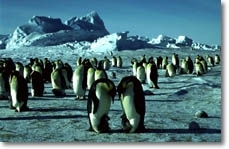 |
| Stephanie Jenouvrier (Jean-Francois Deroubaix/GAMMA) |
Stephanie Jenouvrier is a population ecologist with a PhD from the University of Paris VI. A population ecologist is a scientist that focuses on the dynamics of populations in the context of ecological questions. In her case, questions relating to conservation biology and the effects of climate change on the population dynamics of an Antarctic seabird community. This means she's going to try to find out why emperor penguins are having trouble repopulating. Stephanie has just been awarded a UNESCO-L'Oreal Women in Science Fellowship that will allow her to investigate the influence of global warming on emperor penguins, the same penguins that were featured in the popular movie, March of the Penguins. According to Stephanie, "the study of global climate change is internationally recognized as a priority, but until recently, most studies have concentrated on its influence on physicochemical exchanges between the oceans, atmosphere and geosphere. The effects of climate change on ecosystems have so far been difficult to predict accurately because of the multiplicity of possible interactions between physical and biological processes. The ecological consequences of climate change are expected to be particularly dramatic in Polar Regions. Understanding the consequences of global warming at the population level is an essential precursor to predicting the future of species, communities and whole ecosystems."
 |
| Stephanie at the Awards ceremony in Paris, France (L'Oreal Paris) |
Stephanie was in primary school when her mother gave her a World Wildlife Fund calendar with stickers of animals and the environment they live in. Thanks to these images of fauna and flora and animal documentaries, she was hooked. "I have always been moved by nature's beauty and impressed by the diversity of animal and plant species. I became a scientist to try to protect and understand this fascinating heritage that is the diversity of life. The magnitude and strength of the effects of global changes (human causes as well as global warming) on our environment have always riveted my attention."
 |
| Emperor Penguins (awi-bremerhaven.de) |
Dr. Jenouvrier chose ecology at the start of her university studies. She explained, "The polar environment has always impressed me by its beauty, and the astonishing capacity of its species to adapt to extreme environments. For my PhD thesis, I was very lucky to meet Henri Weimerskirsch, Research Director at the Center for Biology Research in Chize (a CNRS laboratory)." Stephanie had applied for a winter study trip to the French Antarctic territories (financed by the Paul-Emile Victor Polar Institute) and Henri, "made my dream come true. During my PhD, I showed the strong impact of sea ice on the demographic parameters and the population sizes of three species: emperor penguins, snow petrels and southern fulmars. Analysis of the variability of the demographic parameters, population sizes and environmental variables suggested a warm regime shift in the Antarctic ecosystem at the end of the 1970's. Emperor penguin populations were more susceptible to environmental variations than snow petrel and southern fulmar populations since petrels can avoid the important cost of reproduction by skipping a reproduction during unfavorable years. The future of the population of the penguins will be uncertain in the context of climate change and other events such as the regime shift during the late 70's."
 |
| WHOI research vessels in port |
With her fellowship grant, Stephanie now hopes to understand why the emperor penguins, who lost 50% of their population in the late 70's, have not recovered their numbers, even though environmental conditions seem to be similar to those before this dramatic decrease of population. "Furthermore," she explained, "we wish to predict the future of this population in the context of current global warming and climate change, and estimate their chances of survival."
Stephanie chose to go abroad to do her research at the Woods Hole Oceanographic Institute in Massachusetts, USA. WHOI is America's largest independent, non-profit, oceanographic research facility, focusing on marine biology and mathematical tools in ecology. It's also where Hal Caswell works. He is the most renowned international researcher in the field of modeling using Leslie matrices (i.e., tables structured by class (for example age class) with a summary of the demographic parameters, like fecundity and survival). This model permits one to study the demographic processes of penguins. Stephanie told me, "I have met Hal many times at scientific conferences. We have had the opportunity to collaborate in work sessions regarding the albatross, and to study the impact of climate change and fisheries on this highly endangered species. He also participated in the jury of my doctorate. I feel very lucky, thanks to the support of Henri Weimerskirch and the international notoriety of our CNRS lab, the Center for Biology Research in Chize, to be able to do this postdoctoral project with a researcher with such a high reputation in a lab of this level in the US. Winning this fellowship gives me the funds to complete this project that I started 2 years ago. I'm very happy to have this chance." Stephanie plans to share her newfound knowledge with future generations through publishing her findings either in books for general readers or through teaching.
There are scientists on both sides of the global warming issue. We hear about it in the news and it can be very confusing. Who do we believe? I asked Stephanie how she would raise awareness on the effects of global warming and if she thinks anybody is listening. "Unfortunately I think people do not realize the importance and the speed of the changes the earth is facing. I think there is a lack of political decisions to seriously confront these problems. Climate changes are related to long-term decision making and politicians seldom see beyond their immediate mandate. People could change that with their vote and by changing consumption habits. Like recycling. Don't buy stuff with big packaging that can only go straight to a landfill. Demand change. Buy organic food because it doesn't contain pesticides and chemicals that harm the land, air or water. Grow some of your own vegetables and make compost from its waste (vegetable peelings and so on). Walk or use a bicycle because cars are big polluters. Get information and use renewable energy. This sounds like a lot but it is important to choose a way of life that is in agreement with your ideology. I try to take my own advice and reduce my consumption in all these areas."
 |
| Leslie Matrix (zoology.ubc.ca) |
What does a typical day look like for a population ecologist?
"In the lab, I work on a computer and run demographic models. In the field, I take a census on animals and plants. For example on birds, I band birds, and check if they have any eggs or chicks and so on."
Stephanie Jenouvrier is an admirer of Rachel Carson, the pioneering woman scientist of the late 50's and early 60's, who wrote Silent Spring. This was the book that blew the whistle on the harmful effects of chemicals on our ecosystems. Interestingly, Rachel Carson also spent time at WHOI. Stephanie likes travelling, climbing, hiking, bicycling, swimming and partying with friends. Her biggest goal in life is, "to be happy." And her advice to girls looking to make a career in science is, "Always believe in your projects and don't become discouraged."
When asked to identify her hero, Stephanie admitted to not having one, but confessed to being fascinated "by the adventures of people engaged in causes they believe in."
Thank you, Stephanie, for believing in the environment and good luck on your journey.
Page created on 8/17/2014 10:39:11 AM
Last edited 1/9/2017 11:11:44 PM
